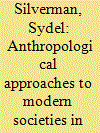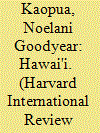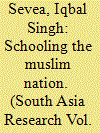|
|
|
Sort Order |
|
|
|
Items / Page
|
|
|
|
|
|
|
| Srl | Item |
| 1 |
ID:
109976


|
|
|
|
|
| Publication |
2011.
|
| Summary/Abstract |
At the time that Julian Steward was formulating the Puerto Rico Project, several other approaches to complex societies were being pursued by American anthropologists. Beginning in the 1920s, funders'-and subsequently, New Deal agencies'-interest in addressing social problems impelled microcosmic community studies in the United States. That approach, essentially functionalist and ahistorical, was extended to village studies in other countries, and Redfield's folk-urban continuum became the dominant theoretical framework for comprehending regions within nations. Concurrently, acculturation theory legitimized anthropological interests beyond "primitives" and offered an alternative, two-way cultural contact model. With the onset of World War II, the culture and personality approach was applied to strategic nations, providing holistic configurational depictions of national character. Steward's effort can be seen as a critique of, and alternative to, these approaches that were prevalent in the late 1940s. Building upon his method of cultural ecology, his orientation toward work, and his notions about sociocultural integration, he devised a different way of studying a total society. Steward's framework was modified and expanded by members of his team, both in the field and in the writing of the jointly authored book. While slow to have a wider impact, the project-both in its successes and its limitations-signaled new departures for the anthropological study of the modern world.
|
|
|
|
|
|
|
|
|
|
|
|
|
|
|
|
| 2 |
ID:
129201


|
|
|
|
|
| Publication |
2014.
|
| Summary/Abstract |
The lawful Government of Hawaii was overthrown without the drawing of a sword or the firing of a shot by a process which, it may be safely asserted, is directly traceable to and dependent for its success upon the agency of the United States acting through its diplomatic and naval representatives…By an act of war, committed with the participation of a diplomatic representative of the United States and without authority of Congress, the Government of a feeble but friendly and confiding people has been overthrown. A substantial wrong has thus been done which a due regard for our national character as well as the rights of the injured people requires we should endeavor to repair.
|
|
|
|
|
|
|
|
|
|
|
|
|
|
|
|
| 3 |
ID:
183152


|
|
|
|
|
| Summary/Abstract |
This analysis examines the British government’s failure to commit adequate resources to defend the Netherlands from the threat of revolutionary France in the campaigns of 1793, 1794, and 1795. Alongside well-known military and diplomatic setbacks, the inadequacy of Britain’s engagement remains best understood by examining ministers’ preconceptions of the Netherlands and Dutch national character. These understandings largely derived from British public opinion concerning the Netherlands. The analysis shows that British perceptions of Dutch strength, wealth, and national character led ministers to presume too much of their ally and contributed to limiting their own commitments.
|
|
|
|
|
|
|
|
|
|
|
|
|
|
|
|
| 4 |
ID:
103689


|
|
|
|
|
| Publication |
2011.
|
| Summary/Abstract |
This article examines Muhammad Iqbal's critique of contemporary approaches towards Muslim education. In his writings, poetic and prose, Iqbal took on both the traditional religious authorities who administered the Madrasas and the modernists associated with the Aligarh College for failing to provide an education that was true to the 'national character' and to develop a synthesis of Islamic and western knowledge. While the former were criticised for ignoring modern intellectual developments, the latter were attacked for being intellectually captive to the West. At a broader level, this article employs Iqbal as a foil to debates over the empowering potential of western education. Iqbal's views are examined against the background of attempts by Muslim intel-lectuals to negotiate between the adoption of a universal modern education and the development of an educational system that kept Muslims grounded in Islam and their 'national character'. These negotiations took on a number of shapes, pedagogical and polemical as well as theological.
|
|
|
|
|
|
|
|
|
|
|
|
|
|
|
|
|
|
|
|
|